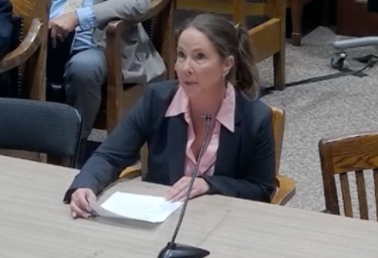Coalition Testifies in Support of State Funding Alternatives For South Coast Town Wastewater Projects

Clean Water Advocacy Vice President Korrin Petersen testified in front of the Joint Committee on Environment and Natural Resources on July 1 on Beacon Hill.
Coalition Clean Water Advocacy Vice President Korrin Petersen testified in front of the Joint Committee on Environment and Natural Resources on July 1 on Beacon Hill to support S. 638 and H. 1000.
These concurrent bills filed at the beginning of the session by Massachusetts State Sen. Mark Montigny (2nd Bristol and Plymouth) and State Representative Christopher Markey (9th Bristol) seek to establish a commission to study and recommend specific funding alternatives for essential wastewater improvement projects.
The Buzzards Bay Coalition has estimated that more than $2 billion is needed to combat wastewater pollution that adversely affects the health of the Bay. The state’s current revolving loan fund does not meet the need.
In 2024, the State Revolving Fund awarded just over $817 million statewide for new wastewater construction projects. Out of that, only about $76 million—or just 9.3%—went to non-Cape communities around Buzzards Bay.
“With a $2 billion problem, that’s not nearly enough,” said Petersen. “The lack of available grants and funding means that projects don’t move forward. The longer it takes to build these projects, the more expensive it becomes, making it even more difficult to move forward. This vicious cycle only means that more generations will be robbed of their right to clean water.”
Other areas facing similar wastewater financing challenges – from Cape Cod to Long Island to Chesapeake Bay – have developed their own funding streams.
“We believe that there is an answer to the Southcoast’s wastewater challenge too,” said Petersen. “These bills bring together the right voices—state leaders, municipal officials, environmental advocates, and financial experts—to identify sustainable, regionally appropriate financial solutions to protect our coastal waters.”
The legislation notes that this new commission should consist of 21 members and include the chairs of the joint committee on environment and natural resources, who shall serve as co-chairs.
Funds will help towns upgrade their sewer infrastructure to connect more septic systems to sewerage, expand capacity and upgrade the level of treatment at existing wastewater treatment facilities, construct additional wastewater treatment facilities to address expanded service areas, reduce combined sewer overflow (CSO) discharges, and upgrade septic systems to nitrogen reducing systems.
The recommendations shall identify “fair and equitable means of financing wastewater infrastructure improvements” to address wastewater pollution, according to the bills’ language.